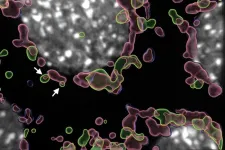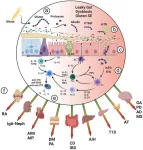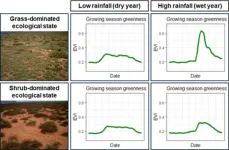(Press-News.org) A new study that examined health data on 18 million people reveals higher incidence of mental illnesses for up to a year following severe COVID-19 in unvaccinated people. Vaccination appeared to mitigate the adverse effects of COVID-19 on mental illnesses. The University of Bristol-led study, published in JAMA Psychiatry today [21 August], investigated associations of COVID-19 with mental illnesses according to time since diagnosis and vaccination status.
COVID-19 is associated with mental illnesses in both hospital and population-based studies. However, until now, there was limited evidence about the association of COVID-19 with mental illnesses when individuals had received COVID-19 vaccination.
A cross-institution team, including researchers from University of Bristol Medical School, University College London (UCL), University of Oxford, University of Cambridge and Swansea University Medical School, sought to answer this by analysing the medical records of 18,648,606 adults aged between 18 and 110 years and registered with a GP in England.
Among the 18,648,606 adults in the cohort studied during the period before vaccination was available, the average age was 49 years, 50.2 per cent were female (9,363,710) and 1,012,335 adults had a confirmed COVID-19 diagnosis (recorded in testing data, by a GP, in hospital or in their death record).
The authors also studied a vaccinated cohort including 14,035,286 adults, of whom 866,469 had a confirmed COVID-19 diagnosis, with an average age of 53 years and 52.1 per cent female (7,308,556), and an unvaccinated cohort including 3,242,215 adults, of whom 149,745 had a confirmed COVID-19 diagnosis, with an average age of 35 years and 42.1 per cent female (1,363,401).
Using these data, the researchers compared the incidence of mental illnesses in people before and after a COVID-19 diagnosis, in each cohort. Mental illnesses included in this study comprised depression, serious mental illness, general anxiety, post-traumatic stress disorder, eating disorders, addiction, self-harm, and suicide.
The team found that the incidence of most of these conditions was higher one to four weeks after COVID-19 diagnosis, compared to the incidence before or without COVID-19. This elevation in the incidence of mental illnesses, was mainly seen after severe COVID-19 that led to hospitalisation and remained higher for up to a year following severe COVID-19 in unvaccinated people.
The elevation in incidence of mental illnesses was mainly after severe COVID-19 that led to hospitalisation, with little elevation after COVID-19 that did not lead to hospitalisation. For instance, the incidence of depression after non-hospitalised COVID-19 was up to 1.22 times higher than that before or without COVID-19, while the incidence of depression after hospitalised COVID-19 was up to 16.3 times higher than that before or without COVID-19. In the vaccinated cohort, the incidence of depression after non-hospitalised COVID-19 was similar to that before or without COVID-19.
The findings add to a growing body of evidence highlighting the higher risk of mental illnesses following COVID-19 diagnosis, and the benefits of vaccination in mitigating this risk, with stronger associations found in relation to more severe COVID-19 disease, and longer-term associations relating mainly to new-onset mental illnesses.
Dr Venexia Walker, Senior Research Fellow in Epidemiology at Bristol Medical School: Population Health Sciences (PHS) and MRC Integrative Epidemiology Unit at the University of Bristol, and one of the study’s lead authors, said: “Our findings have important implications for public health and mental health service provision, as serious mental illnesses are associated with more intensive healthcare needs and longer-term health and other adverse effects.
“Our results highlight the importance COVID-19 vaccination in the general population and particularly among those with mental illnesses, who may be at higher risk of both SARS-CoV-2 infection and adverse outcomes following COVID-19.”
Jonathan Sterne, Professor of Medical Statistics and Epidemiology at the University's Bristol Medical School: PHS, Director of the NIHR Bristol Biomedical Research Centre, and one of the study’s authors, added: “We have already identified associations of COVID-19 with cardiovascular disease, diabetes and now mental illnesses. We are continuing to explore the consequences of COVID-19 with ongoing projects looking at associations of COVID-19 with renal, autoimmune and neurodegenerative conditions.”
This work was supported by the COVID-19 Longitudinal Health and Wellbeing National Core Study, which is funded by the Medical Research Council (MRC) and National Institute for Health and Care Research (NIHR).
END
Study of 18 million people finds increased mental illnesses incidence following severe COVID-19, especially in unvaccinated people
2024-08-21
ELSE PRESS RELEASES FROM THIS DATE:
Nearly 90 percent of NYC transit workers have been harassed or assaulted
2024-08-21
The COVID-19 pandemic brought an increase in crime to New York City’s subways and buses. The transit system’s employees—especially female workers—have frequently been on the receiving end of attacks, according to a new study published in the Journal of Urban Health.
The study, led by researchers at the NYU School of Global Public Health, found that 89 percent of public-facing transit workers in New York City experienced harassment or violence on the job during the pandemic (2020-2023).
“Transit workers are our city’s unsung heroes—they kept New York City functioning during the COVID-19 pandemic, ...
COVID-19 and mental illnesses in vaccinated and unvaccinated people
2024-08-21
About The Study: In this cohort study, depression, serious mental illness, general anxiety, posttraumatic stress disorder, eating disorders, addiction, self-harm, and suicide were elevated during weeks 1 through 4 after COVID-19 diagnosis compared with before or without COVID-19. Incidence was lower in people who were vaccinated when they had COVID-19 and incidence was higher, and persisted longer, after hospitalization for COVID-19. The findings support recommendation of COVID-19 vaccination in the general population and ...
New heaviest exotic antimatter nucleus
2024-08-21
UPTON, N.Y. — Scientists studying the tracks of particles streaming from six billion collisions of atomic nuclei at the Relativistic Heavy Ion Collider (RHIC) — an “atom smasher” that recreates the conditions of the early universe — have discovered a new kind of antimatter nucleus, the heaviest ever detected. Composed of four antimatter particles — an antiproton, two antineutrons, and one antihyperon — these exotic antinuclei are known as antihyperhydrogen-4.
Members of RHIC’s STAR Collaboration made the discovery by using their house-sized particle detector ...
Virtual learning in kindergarten through grade 12 during the COVID-19 pandemic and chronic absenteeism
2024-08-21
About The Study: Chronic absenteeism rates were substantially higher in school districts that used virtual learning during the COVID-19 pandemic compared with in person in this cross-sectional study. Understanding how to reduce chronic absenteeism and use virtual learning without potentially negative consequences are key policy questions moving forward.
Corresponding Author: To contact the corresponding author, William N. Evans, PhD, email wevans1@nd.edu.
To access the embargoed study: ...
Self-repairing mitochondria use novel recycling system, study finds
2024-08-21
Mitochondria, the so-called “powerhouse of the cell,” depend on a newly discovered recycling mechanism identified by scientists at The Hospital for Sick Children (SickKids).
Mitochondria are tiny structures inside of cells that carry out a wide range of critical functions, including generating energy to help keep cells healthy. Every mitochondrion has two layers of membranes: the outer membrane and the inner membrane. On the inner membrane, folds called cristae contain proteins and molecules needed for energy production. ...
Mobile species are ‘glue’ which connect different habitats together, study finds
2024-08-21
A groundbreaking study conducted across 30 field sites in the southwest UK has revealed the importance of incorporating varied habitats into the landscape at large.
The research, published today in Nature and led by ecologists at the University of Bristol, addresses critical questions in conservation and land management, shedding new light on species interactions and how food chains operate across multiple habitats.
The study found significant differences in food web structures among landscapes with one, two, or three habitats, including a more evenly distributed abundance of species. Multi-habitat landscapes host a higher number ...
Physicists discover heaviest antimatter hypernucleus to date
2024-08-21
Physicists from the STAR Collaboration have observed a new antimatter hypernucleus, antihyperhydrogen-4, for the first time. This is the heaviest antimatter hypernucleus discovered in experiments to date. This study, led by researchers from the Institute of Modern Physics (IMP) of the Chinese Academy of Sciences, was published in Nature on Aug. 21.
Current physics assumes that the properties of matter and antimatter are symmetrical and that equal amounts of matter and antimatter existed at the birth of the universe. However, some mysterious physical mechanism caused the annihilation of most matter and antimatter, with only about one in ten billion matter particles ...
Pediatric functional gastrointestinal disorders: pathophysiology, diagnosis and management
2024-08-21
Functional Gastrointestinal Disorders (FGIDs), also known as disorders of gut-brain interaction, encompass a wide range of conditions that cannot be attributed to structural, biochemical, or organic abnormalities. These disorders vary significantly from infancy to adulthood, with distinct manifestations in neonates/toddlers and children/adolescents. The ROME criteria, updated periodically, currently in use is ROME IV, which facilitates early and accurate diagnosis of FGIDs. Despite their prevalence, pediatric FGIDs pose diagnostic and therapeutic challenges due to children's inability to articulate symptoms and the influence ...
Gluten is a proinflammatory inducer of autoimmunity
2024-08-21
The interaction between humans and their environment, mediated by nutrition, plays a crucial role in regulating inflammatory responses. Chronic inflammatory diseases have been on the rise, and the scientific community has been actively exploring pro-inflammatory nutrients as potential therapeutic targets. Gluten, a major component of wheat, barley, and rye, has been implicated in numerous health issues, particularly celiac disease (CD). This review essay summarizes the key findings of a recent study published in the Journal of Translational Gastroenterology, focusing on the proinflammatory effects of gluten and its implications in autoimmunity.
Gluten and ...
Eyes in the sky and on the ground: enhanced dryland monitoring with remote sensing
2024-08-21
While animals in drylands hone their natural senses to find vegetation, humans have developed “external eyes” to track these vital resources.
Scientists from the U.S. Department of Agriculture (USDA) Agricultural Research Service (ARS) have created an advanced method that integrates high-frequency near-surface camera data with broader satellite imagery to better monitor and assess dryland ecosystems. Their approach could aid in taking timely action to prevent land degradation, contributing to improved environmental management and conservation strategies.
Their results were published in the Journal of Remote Sensing on July 8.
Drylands, including ...





